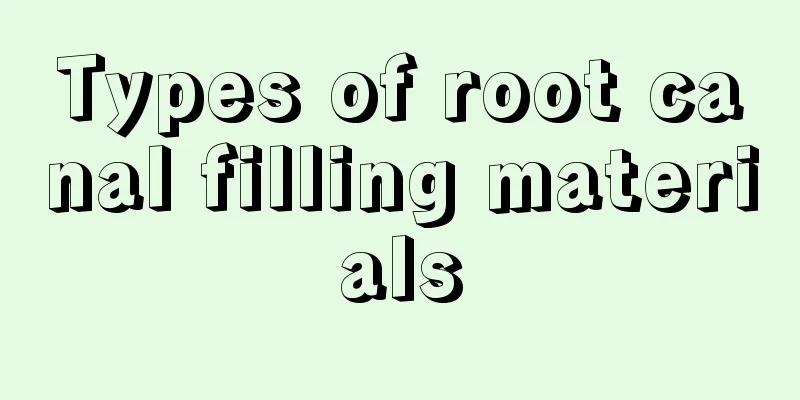Types of root canal filling materials

|
We usually see many types of root canals, and most people may not be able to distinguish their material composition. In fact, there are three main types of materials: solid, paste and liquid. Of course, different types have different uses and effects, and people who are not professionals may not understand them. Here is a detailed introduction to the types of root canal filling materials. Solid root canal filling materials 1. gutta-percha points It has a certain degree of compressibility (3% to 6% of volume). It softens when heated, and its volume increases as the temperature increases, making it easy to take out. The gutta-percha tip has a certain tissue affinity and is suitable for various pulpitis, pulp necrosis, gangrene, various apical periodontitis, and permanent filling of the root canals of teeth that have failed vital pulp preservation treatment after pulp removal. It has X-ray blocking properties, making it easy to detect and observe. Soluble in solvents such as chloroform and ether. It is often used in conjunction with root canal filling paste to tightly fill the root canal. 2. Silver cones It has high mechanical properties, certain bactericidal and antibacterial effects, X-ray blocking properties, and can be used for curved root canals. However, its corrosion resistance is poor. 3. Plastic points It is a root canal sealing material usually composed of polypropylene or polystyrene. It is elastic, easy to apply and has good tissue affinity. However, X-ray transmittance is poor, which is not conducive to detection. Paste root canal filling materials Paste-type root canal filling materials are usually used together with solid root filling materials. They are made by mixing powder and liquid into a paste, which can harden after filling. It is mainly used to bond solid materials to the root canal wall and fill the gap between the solid material and the root canal wall. As a lubricant, it can improve the position of solid materials; it can also be used as a bactericidal agent to act on accessory root canals, tooth resorption, root fractures and other gaps that solid materials cannot enter. Liquid root canal filling materials Phenolic resin The main components are resorcinol and formaldehyde, which quickly polymerize into phenolic resin. It has high fluidity, good permeability and antibacterial effect. After polymerization, it is less irritating to the periapical tissues. The reddish brown color can penetrate into the dentinal tubules and discolor the dentin. It does not block X-rays and the filling effect cannot be checked. It is highly irritating to mucous membranes and other tissues. It is used in cases of curved root canals, narrow root canals or accidental instrument breakage in posterior teeth. The above is a detailed introduction to the types of root canal filling materials. Through the above introduction, you may have some knowledge about root canal filling materials. You can also learn that root canals are closely related to our lives and can be used in many aspects. We hope our introduction will help you understand this knowledge. |
<<: What is the reason for phlegm in the throat
>>: How to regulate sub-health of liver, spleen and kidney
Recommend
It is very important to know the early symptoms of nasopharyngeal cancer
Generally speaking, nasopharyngeal carcinoma is a...
What are the early symptoms of recurrence after hemisection of thyroid cancer
Hemisection of thyroid cancer means that after he...
Is urea nitrogen the same as urea
Urea is actually a kind of fertilizer widely used...
What to do if liver cancer metastasizes into the liver
Intrahepatic metastasis of liver cancer may inclu...
What medicine can I take to relieve pain in nasopharyngeal cancer
Nasopharyngeal carcinoma patients can choose drug...
Are dark circles just caused by poor sleep? Do you know the causes of dark circles?
Dark circles usually refer to the gray-black colo...
What is the response to chemotherapy for pancreatic cancer
What is the response to chemotherapy for pancreat...
Can I drink chrysanthemum and wolfberry tea when I have a cold?
Chrysanthemum and wolfberry tea is drinkable as l...
What are the dangers of wearing a wig
Modern people live under great pressure, and some...
What are removable dentures
Teeth are an indispensable organ in our human bod...
How to eat kiwi fruit without making it sour
After buying kiwi fruit, if it is not particularl...
Swollen face after allergy
When facial allergies cause swelling, it is neces...
What's wrong with my thighs being sore?
It is very common to feel soreness in both thigh ...
The noodles are a bit sour, can I eat them?
People in the north prefer to eat noodles, which ...
Pillow for treating cervical vertebra
With the accelerating pace of life and the increa...









